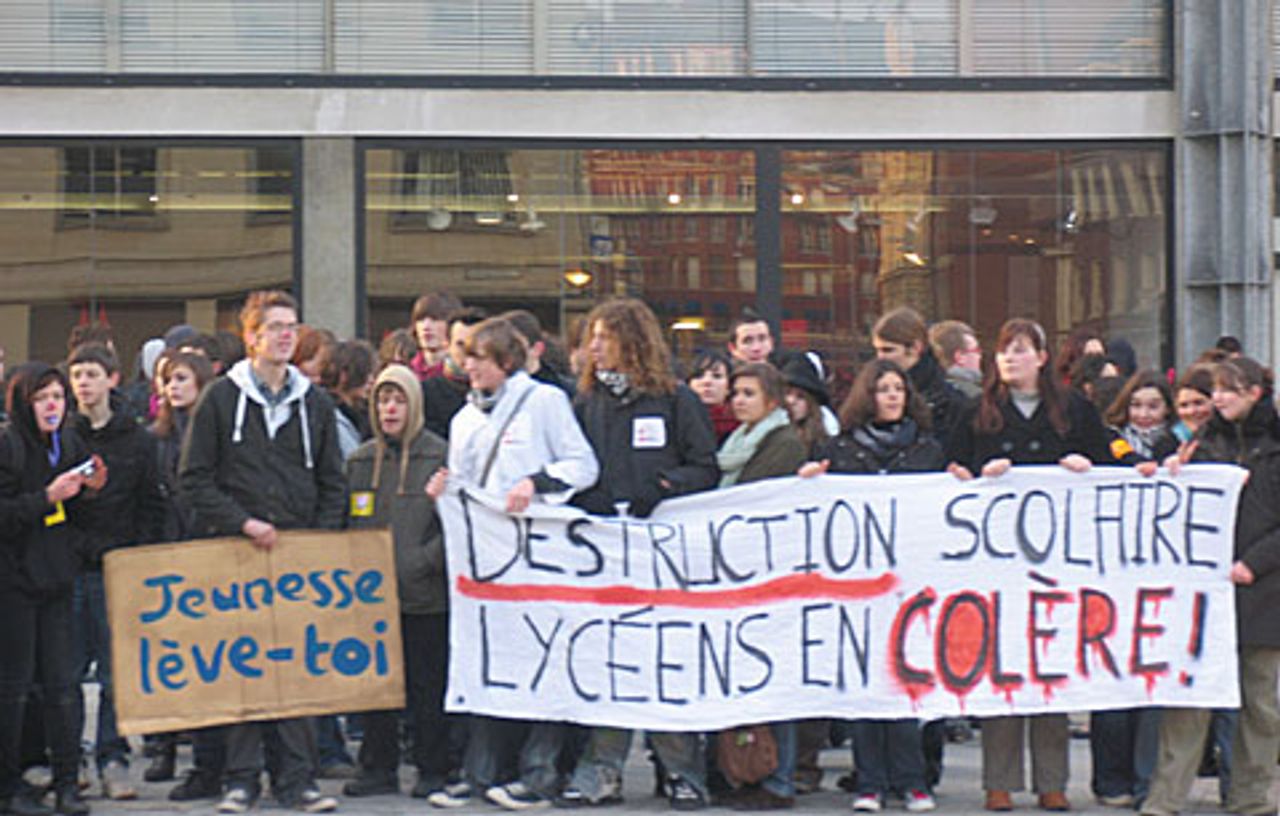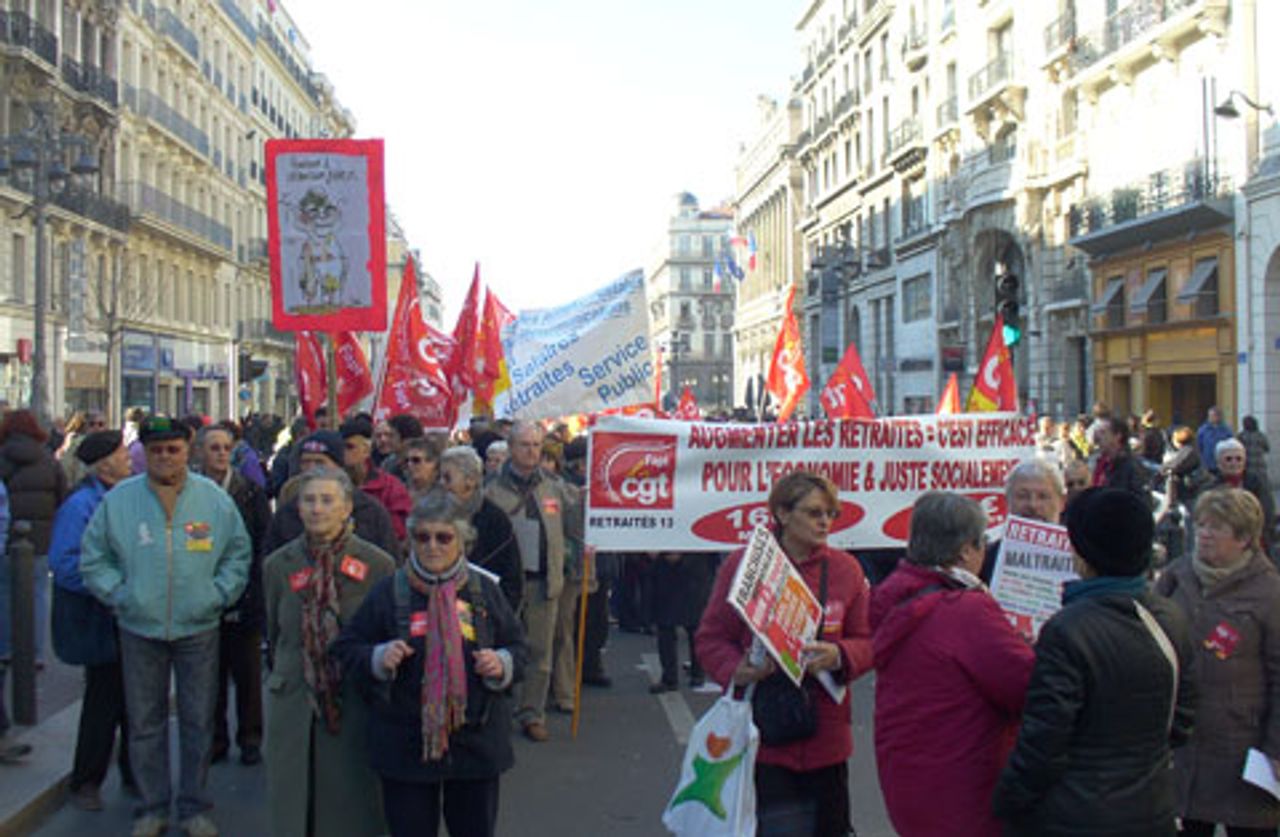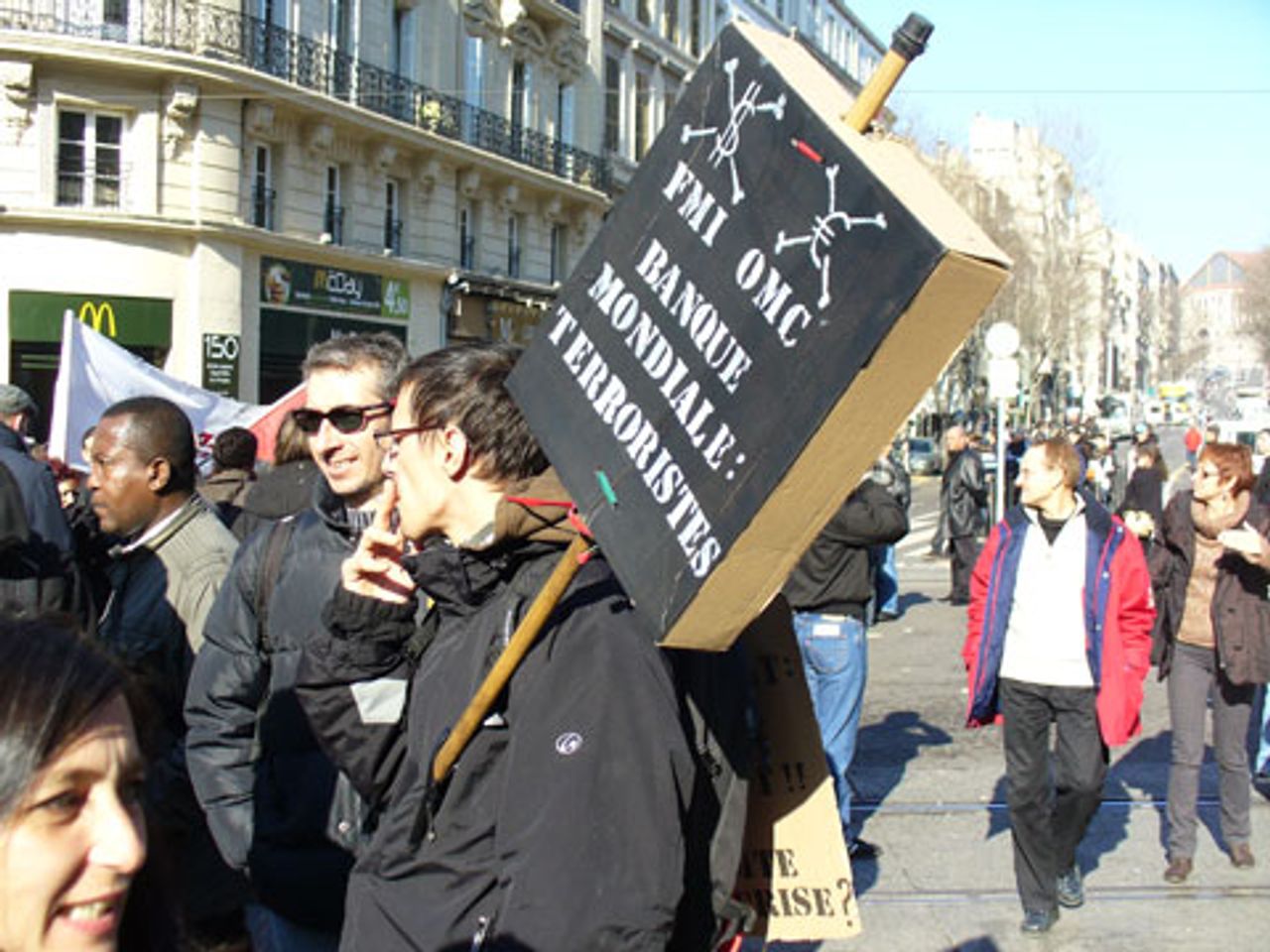Ruling circles in France have reacted with considerable nervousness to the massive response to Thursday’s day of action. At least 2.5 million workers and youth took to the streets in protest against soaring unemployment figures and austerity policies that attack jobs, working conditions and the provision of public services.
Nearly 2 million public service workers struck, as well as large numbers of railway, electricity and postal workers. Participation of a significant number of private sector workers could bring the total of strikers up to over 3 million. The conservative Le Figaro wrote that the numbers “make one dizzy.”
 Amiens high school students, signs read: "Youth arise" and "Educational destruction--students angry"
Amiens high school students, signs read: "Youth arise" and "Educational destruction--students angry"
Occupations and blockades are ongoing in high schools and universities. Workers on the demonstrations told the World Socialist Web Site that there were plans in their sectors to continue strike action despite the one-day limit imposed by the eight trade unions that organised the January 29 protests. The postal sorting office at Nanterre is being occupied.
Despite public affirmations that he will stay on course with his regressive social and economic policies, privately President Nicolas Sarkozy is said to be nervous of exacerbating the situation and encouraging the continuation and spread of the strike movement. According to the satirical weekly Le Canard Enchaîné, he told aides, “The ground upon which we walk is not so firm. The time for forcing (reforms) through is over. This is no time to wave a red flag at the unions.”
Le Monde January 30 makes clear that the president is relying on the trade unions to help control the situation. Sarkozy issued a communiqué on Thursday evening saying that he would meet in February with the “social partners”—the employers and trade unions—“so as to agree on the reforms to be carried out in 2009 and the methods to achieve them.”
A feature of the protest was the ostentatious presence of Socialist Party (PS) leaders, including party leader Martine Aubry, “in support” of the protests. This was the first such appearance since the unpopularity of the PS, caused by the pro-capitalist policies of the Plural Left government of Lionel Jospin (1997–2002), of which Aubry was a leading member. The SP is clearly positioning itself to be available to form a crisis government in order to head off a mass movement of the working class and youth that might threaten bourgeois rule.
World Socialist Web Site correspondents reported from various French cities and towns:
Paris
Pierre Mabut in Paris reported that demonstrators were mainly from the public sector—postal workers, hospital workers, teachers, local government—and represented a grass roots mobilization. The Socialist Party (PS) was very much in view, as well as the Left Party led by Senator Jean-Luc Mélenchon, formed in December in a split with the SP.
Teachers from a training institute carried a banner reading, “Save teacher training—No to the smashing of public education.”
Parisian hospital workers, members of the FO (Force Ouvrière-Workers Power) trade union, had a banner reading, “General strike by joint unions—No grouping of hospitals—Withdraw the Bachelot [hospital reform] laws.”
The WSWS interviewed several demonstrators:
Iris, a high school student in her final year, was one of a delegation of 50 from Louise Michèle Lycée in Champigny-sur-Marne. She said, “I’m here to protest against the repression of youth; also against the government policy of beating down undocumented immigrants, the destruction of social gains and lack of resources for education.
“Sarkozy’s €360 billion bailout of the banks is an illustration of his policy of sacrificing the public sector to the advantage of the private sector. There is not any real opposition to Sarkozy. The unions are under the government’s thumb. They only want a compromise. But we need a real reform of the system. The way to oppose the government is to make way for the youth and to stop the parties and unions from hanging on to power.”
Jack, a student at Paris IV university, said, “I think the €360 billion bank bailout is a real stupidity, a rotten compromise. The government does not have a long-term solution to deal with the economic crisis. One-day actions are not enough. We need more unity between public services and the public. Separate actions by unions are just so much demagogy, like the government. People disagree about what to do, but they are against the system and not for any political party.”
Yann, a young postal worker in Nanterre near Paris, said, “I’m here today because we have had 30 years of government destruction of public services.
“Where I work, productivity has increased 30 percent. Forty thousand jobs have been eliminated out of the 300,000 in the post over four years. Sarkozy’s bank rescue, plus the €26 billion economic stimulus, is going to company profits. It’s part of an offensive of capital against workers. They are using Sarkozy’s reforms to push through their own policies. The unions have been integrated into the system since World War II. They are directly subsidized by the state. We need a general strike, but workers must get involved because the unions won’t call it. It must come from the rank and file. There is no national solution to the crisis.”
Frédéric, a postal worker from Paris, said, “We need a general strike over several days. The way to fight Sarkozy is to reconstruct all the left parties. I always vote blank because we have no political representation.
“A lot of workers are obliged to come to Paris to get work as there is nothing in surrounding towns. Many come from far away to work at the post. It’s now being restructured in preparation for privatization.”
Nancy
Reporting from Nancy, Olivier Laurent said this was a big demonstration—25,000 according to the police. One handmade placard read, “Sarkozy is the havoc [chienlit]”—a term used by Charles de Gaulle about the 1968 general strike”— “UMP = Union for the Misery of the People.”
Workers from different public services under attack, such as education and the judicial system, gave out leaflets in defence of their working conditions.
 The demonstration in Marseille
The demonstration in Marseille
Marseille
Anthony Torres reported that the police counted 20,000 demonstrators, while the unions estimated 300,000.
Valentin, a probationary schoolteacher in Marseille, said, “I’m concerned about the working conditions in public service and purchasing power. It’s shameful handing over that money to the banks and the bosses.
 Protest in Marseille, sign reads: "IMF WTO--World Bank Terrorists"
Protest in Marseille, sign reads: "IMF WTO--World Bank Terrorists"
“The unions keep the status quo, they defend their own interests. The one-day strikes against the pension reforms are useless.”
Amiens
Antoine Lerougetel reported that 10,000 people demonstrated here, largely from the public sector. There were strong contingents—of primary and secondary teachers and hospital and social workers—opposing regulations CC 66, which severely reduces wage increment ceilings and working conditions. There was a large delegation of students from Amiens University, many of whom are occupying faculty buildings, as well as high school students who have been in action against cuts in teaching staff and education provision.
A group of science faculty students spoke of a revolt against a reform that creates a two-tier system of elite and poor universities.
Baptiste said he came from a family of miners and he did not want to see rights won over generations destroyed. “The unions are in the bosses’ pockets and they limit their action,” he said.
He thought that there needed to be a fundamental change, and was opposed to the “mega-corporations.”
Yann, 28, has worked for a social-medical NGO for four years. He said that the CC 66 reform meant a loss of €140,000 over a lifetime of work. His work with the most fragile people in society was getting more and more difficult with the loss of rights and jobs. He feared that the consequences of the economic crisis could be similar to that of 1929, and said, “Now we’re in the fight, there’s still time to turn things round.”
